TERMINALS OF ECU CHECK CERTIFICATION ECU (SMART KEY ECU ASSEMBLY)
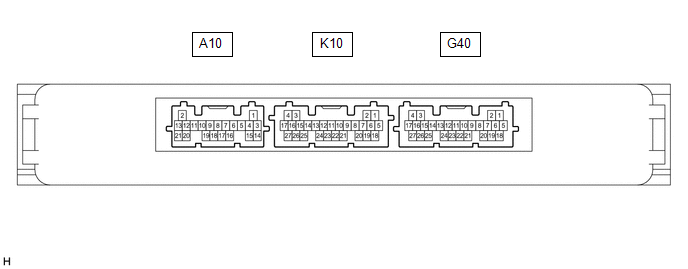 (a) Disconnect the A10, K10 and G40 certification ECU (smart key ECU assembly) connectors.
(b) Measure the voltage and resistance according to the value(s) in the table below.
HINT: Measure the values on the wire harness side with the connector disconnected. |
Tester Connection | Wiring Color |
Input / Output | Terminal Description |
Condition | Specified Condition |
Related Data List Item/DTC | |
A10-16 (NE) - Body ground |
G - Body ground | Input |
Engine speed signal | Always |
10 kΩ or higher | Engine Condition | |
K10-25 (STP1) - Body ground |
BE - Body ground | Input |
Stop light switch signal |
Brake pedal depressed → Brake pedal released |
9 V or higher → 1 V or less |
Stop Light Switch1 | |
G40-4 (+B) - G40-18 (E) |
W - W-B | Input |
Power source | Always |
11 to 14 V | - | |
G40-22 (P) - G40-18 (E) |
R - W-B | Input |
P position signal | Shift lever in P → Shift lever not in P |
30 kΩ or higher → Below 200 Ω |
Shift P Signal | |
G40-15 (CUTB) - Body ground |
R - Body ground | Input |
Dark current cut pin* |
Always | 11 to 14 V |
- | | G40-18 (E) - Body ground |
W-B - Body ground | - |
GND | Always |
Below 1 Ω | - | |
G40-21 (SSW2) - Body ground |
L - Body ground | Input |
SSW2 contact signal HINT: Backup for SSW1. Behaves the same way as SSW1. |
Engine switch pushed → Engine switch not pushed |
Below 15 Ω → 10 kΩ or higher |
Start Switch2 | |
G40-23 (SSW1) - Body ground |
GR - Body ground | Input |
SSW1 contact signal | Engine switch pushed → Engine switch not pushed |
Below 15 Ω → 10 kΩ or higher |
Start Switch1 | |
G40-19 (SPD) - Body ground |
R - Body ground | Input |
Vehicle speed signal |
Always | 30 kΩ or higher |
Vehicle Speed Signal |
- *: In order to prevent the vehicle battery from being depleted when the
vehicle is shipped long distances, a fuse that cuts unnecessary
electrical load while the vehicle is being shipped is installed in the
circuit. If the fuse is removed, the circuit becomes open. If the fuse
that is between the vehicle battery and terminal CUTB is removed and the
circuit is open, the certification ECU (smart key ECU assembly) changes
to a certain control mode (example: the transmission of radio waves
every 0.25 seconds, which form the detection area, stops).
(c) Connect the A10, K10 and G40 certification ECU (smart key ECU assembly) connectors.
(d) Measure the voltage and resistance, and check for pulses according to the value(s) in the table below. |
Tester Connection | Wiring Color |
Input / Output | Terminal Description |
Condition | Specified Condition |
Related Data List Item/DTC | |
A10-20 (STA) - G40-18 (E) |
L - W-B | Input |
When
starting the engine, this monitors the voltage sent from terminal STAR
to the starter relay to judge whether the engine is "being started". |
Engine
switch pressed and held with brake pedal depressed (starter on) →
Approximately 1 second after engine switch released (starter off) |
6 V or higher*2 → 1.0 V or less |
- | |
A10-9 (STAR) - G40-18 (E) |
P - W-B | Input / Output |
Outputs voltage to the starter relay
- Outputs voltage (12 V) to the starter relay when starting the engine. (Max. 30 sec. Turns off when an engine speed of 1000 rpm.)
HINT: When Hi is selected, a start request signal (STAR) will not be output even though a start request signal (STSW) is input. |
Engine
switch pressed and held with brake pedal depressed (starter on) →
Approximately 1 second after engine switch released (starter off) |
6 V or higher*2 → 1.0 V or less |
- | | Receives neutral start switch (P, N position detection) signal
- Monitors whether the neutral start switch is on (P or N) or off (other
than P or N). Applies voltage via a resistor (large) in the
certification ECU (smart key ECU assembly). When the neutral start
switch is on, due to the starter relay coil resistance (small) using
some of the voltage, the voltage at terminal STAR will be low (2.7 V or
less), and when the neutral start switch is off, the voltage will be
high (9 V or more).
| Perform the following operations except while the engine is cranking:
- Shift lever in any position other than P or N → Shift lever in P or N (at 20°C (68°F))
| 9 V or higher → 2.7 V or less |
Neutral SW/ Clutch SW | |
A10-16 (NE) - G40-18 (E) |
G - W-B | Input |
Engine speed signal | Idling (engine warmed up) |
Pulse generation (See waveform 1) |
Engine Condition | |
K10-25 (STP1) - G40-18 (E) |
BE - W-B | Input |
Stop light switch signal |
Brake pedal released → Brake pedal depressed |
1 V or less → 9 V or higher |
Stop Light Switch1 | |
G40-14 (SLP) - G40-18 (E) |
G - W-B | Input |
Steering lock position signal |
Steering locked → Steering unlocked |
11 to 14 V → 1.5 V or less |
Steering Unlock Switch | |
G40-25 (SLR+) - G40-18 (E) |
W - W-B | Output |
Steering lock motor operation command signal (Steering lock motor operation permission signal sent from the certification ECU (smart key ECU assembly)) |
When a door is opened, the steering lock motor will be operated if all of the following conditions are met:
- The steering is unlocked.
- The engine switch is off.
- The shift lever is in P.
| Pulse generation
(See waveform 2) | - | |
G40-13 (LIN) - G40-18 (E) |
B - W-B | Input / Output |
LIN communication line |
Engine switch on (IG) |
Pulse generation | Steering Lock Start Cond | |
G40-22 (P) - G40-18 (E) |
R - W-B | Input |
P position signal | Shift lever in P → Shift lever not in P |
9 V or higher → 2.76 V or less |
Shift P Signal | |
G40-21 (SSW2) - G40-18 (E) |
L - W-B | Input |
SSW2 contact signal HINT: Backup for SSW1. Behaves the same way as SSW1. |
Engine switch not pushed → Engine switch pushed |
9 V or higher → 1 V or less |
Start Switch2 | |
G40-23 (SSW1) - G40-18 (E) |
GR - W-B | Input |
SSW1 contact signal | Engine switch not pushed → Engine switch pushed |
9 V or higher → 1 V or less |
Start Switch1 | |
G40-16 (ACCD) - G40-18 (E) |
LG - W-B | Output |
ACC signal | Engine switch off → Engine switch on (ACC) |
1 V or less → 8.5 V or higher |
ACC Relay Monitor | |
G40-17 (IG1D) - G40-18 (E) |
R - W-B | Output |
IG signal | Engine switch on (ACC) → Engine switch on (IG) |
1 V or less → 9 V or higher |
IG Relay Monitor (Outside) | |
G40-19 (SPD) - G40-18 (E) |
R - W-B | Input |
Vehicle speed signal |
Vehicle being driven at approx. 5 km/h (3 mph) |
Pulse generation (See waveform 3) |
Vehicle Speed Signal | |
G40-8 (CLG5) - G40-18 (E) |
B - W-B | Output |
Output to No. 1 indoor electrical key antenna assembly (front floor) |
Procedure:
- Engine switch off
- Electrical key transmitter sub-assembly not inside vehicle
- Within 30 seconds of closing any door
| Pulse generation
(See waveform 4) | - | |
G40-9 (CG5B) - G40-18 (E) |
LG - W-B | Output |
Output
to No. 1 indoor electrical key antenna assembly (front floor) (terminal
on opposite side of component from CLG5 output terminal) |
Procedure:
- Engine switch off
- Electrical key transmitter sub-assembly not inside vehicle
- Within 30 seconds of closing any door
| Pulse generation
(See waveform 4) | - | |
K10-5 (CLG6) - G40-18 (E) |
W - W-B | Output |
Output to No. 1 indoor electrical key antenna assembly (rear floor) |
Procedure:
- Engine switch off
- Electrical key transmitter sub-assembly not inside vehicle
- Within 30 seconds of closing any door
| Pulse generation
(See waveform 4) | - | |
K10-6 (CG6B) - G40-18 (E) |
R - W-B | Output |
Output
to No. 1 indoor electrical key antenna assembly (rear floor) (terminal
on opposite side of component from CLG6 output terminal) |
Procedure:
- Engine switch off
- Electrical key transmitter sub-assembly not inside vehicle
- Within 30 seconds of closing any door
| Pulse generation
(See waveform 4) | - | |
G40-5 (TXCT) - G40-11 (AGND) |
GR - BE | Output |
Signal output to transponder key amplifier |
Engine switch off, brake pedal not depressed, 30 seconds or more after driver door opened and then closed |
Below 1 V |
- BCC Malfunction
- Abnormal Status
- Different Encrypt Code
- Different Serial Number
- Frame Error
- Response
| | G40-6 (CODE) - G40-11 (AGND) |
B - BE | Input |
Signal input from transponder key amplifier |
Engine switch off, brake pedal not depressed, 30 seconds or more after driver door opened and then closed |
Below 1 V | |
G40-7 (VC5) - G40-11 (AGND) |
BE - BE | Output |
Transponder key amplifier power supply |
Engine switch off, brake pedal not depressed, 30 seconds or more after driver door opened and then closed |
Below 1 V | |
G40-11 (AGND) - Body ground |
BE - Body ground | - |
Transponder key amplifier ground |
Always | Below 1 Ω | |
G40-5 (TXCT) - G40-11 (AGND) |
GR - BE | Output |
Signal output to transponder key amplifier (Code
sent from certification ECU (smart key ECU assembly) to transponder key
amplifier built into engine switch, and then transmitted by transponder
key amplifier antenna as radio waves) |
Engine switch off, electrical key transmitter sub-assembly not in cabin, within 30 seconds of engine switch pressed |
Pulse generation (See waveform 5) |
- BCC Malfunction
- Abnormal Status
- Different Encrypt Code
- Different Serial Number
- Frame Error
- Response
| | G40-6 (CODE) - G40-11 (AGND) |
B - BE | Input |
Signal input from transponder key amplifier (Radio
waves from transponder key amplifier built into engine switch used to
detect key information. Key information then sent to certification ECU
(smart key ECU assembly)) | Engine switch off, engine switch pressed with electrical key transmitter sub-assembly held near engine switch
HINT: Remove the transmitter battery before performing this inspection. |
Pulse generation (See waveform 6) | |
G40-7 (VC5) - G40-11 (AGND) |
BE - BE | Output |
Transponder key amplifier power supply (Power
supplied from certification ECU (smart key ECU assembly) when
transponder key amplifier built into engine switch activated) |
Engine switch off, electrical key transmitter sub-assembly not in cabin, within 30 seconds of engine switch pressed |
Pulse generation (See waveform 7) | |
A10-3 (EFII) - G40-18 (E) |
V - W-B | Input |
EFI communication input (Signal input from ECM to certification ECU (smart key ECU assembly)) |
Engine switch off | 11 to 14 V |
- B279986
- B279A12
- EFI Code Receive
- Engine Start Request
| | A10-4 (EFIO) - G40-18 (E) |
GR - W-B | Output |
EFI communication output (Signal output from certification ECU (smart key ECU assembly) to ECM) |
Engine switch off | 11 to 14 V → 1 V or less | |
A10-3 (EFII) - G40-18 (E) |
V - W-B | Input |
EFI communication input (Signal input from ECM to certification ECU (smart key ECU assembly)) |
Within
3 seconds of engine start or within 3 seconds of engine switch turned
on (IG) after cable disconnected and reconnected to battery |
Pulse generation (See waveform 8) | |
A10-4 (EFIO) - G40-18 (E) |
GR - W-B | Output |
EFI communication output (Signal output from certification ECU (smart key ECU assembly) to ECM) |
Engine switch turned on (IG) using registered electrical key transmitter sub-assembly |
Pulse generation (See waveform 9) | |
G40-20 (IND) - G40-18 (E) |
W - W-B | Output |
Security indicator output |
Engine switch off → on (IG) |
Pulse generation → Below 2 V |
- | | K10-7 (WCSW) - G40-18 (E)*1 |
LG - W-B | Output |
Wireless charger system stop signal |
Procedure:
- Engine switch off
- Electrical key transmitter sub-assembly inside vehicle
- Engine switch off → on (ACC)
| Below 1 V → 4.5 to 6 V
(For 1 second after engine switch on (ACC)) |
- |
- *1: w/ Wireless Charging System
HINT:
- *2: While the engine is cranking, the battery voltage may drop to approximately 6 V.
- The waveform of the steering lock actuator motor stopped can be checked without performing any particular operation.
- The waveform of the steering lock actuator motor operating can be checked if either of the following operations is performed:
- To unlock the steering, bring the electrical key transmitter
sub-assembly into the cabin and turn the engine switch on (ACC) or on
(IG).
- To lock the steering, open a door with the engine switch off and the shift lever in P.
(e) Using an oscilloscope, check the waveform of the ECU. NOTICE:
The oscilloscope waveform shown in the illustration is an example for reference only. Noise, chattering, etc. are not shown.
(1) Waveform 1 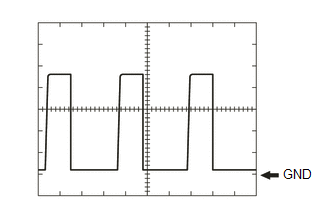 Measurement Condition Measurement Condition |
Item | Content | |
Tester Connection | A10-16 (NE) - G40-18 (E) | |
Tool Setting | 2 V/DIV., 2 ms./DIV. | |
Condition | Idling (engine warmed up) |
HINT: The wavelength becomes shorter as the engine speed increases.
(2) Waveform 2 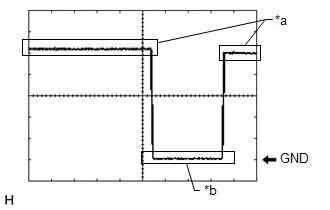
|
*a | Steering lock motor not operating | |
*b | Steering lock motor operating | Measurement Condition |
Item | Content | |
Tester Connection | G40-25 (SLR+) - G40-18(E) | |
Tool Setting | 2 V/DIV., 200 ms./DIV. | |
Condition | When a door is opened, the steering lock motor will be operated if all of the following conditions are met:
- The steering is unlocked.
- The engine switch is off.
- The shift lever is in P.
| (3) Waveform 3
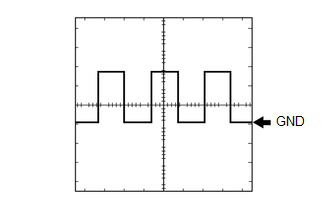 Measurement Condition Measurement Condition |
Item | Content | |
Tester Connection | G40-19 (SPD) - G40-18(E) | |
Tool Setting | 5 V/DIV., 20 ms./DIV. | |
Condition | Vehicle being driven at approx. 5 km/h (3 mph) |
HINT: The wavelength becomes shorter as the vehicle speed increases.
(4) Waveform 4 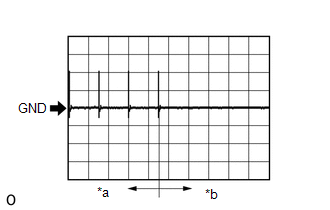
|
*a | For 30 seconds after any door closed | |
*b | After 30 seconds or more have elapsed since any door closed | Measurement Condition |
Item | Content | |
Tester Connection | G40-8 (CLG5) - G40-18 (E)
G40-9 (CG5B) - G40-18 (E) K10-5 (CLG6) - G40-18 (E) K10-6 (CG6B) - G40-18 (E) | |
Tool Setting | 2 V/DIV., 500 ms/DIV. | |
Condition | Procedure:
- Engine switch off
- Electrical key transmitter sub-assembly not inside vehicle
- Within 30 seconds of closing any door
| (5) Waveform 5
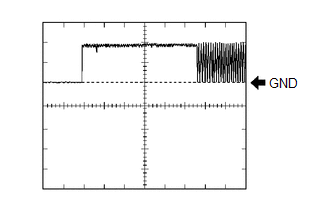 Measurement Condition Measurement Condition |
Item | Content | |
Tester Connection | G40-5 (TXCT) - G40-11 (AGND) | |
Tool Setting | 2 V/DIV., 20 ms./DIV. | |
Condition | Engine switch off, electrical key transmitter sub-assembly not in cabin, within 30 seconds of engine switch pressed |
(6) Waveform 6 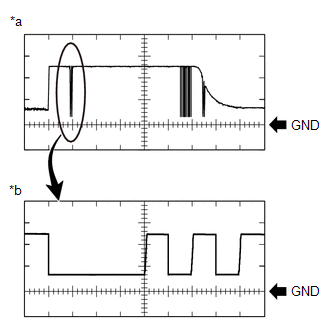
|
*a | Waveform | |
*b | Waveform (detail) | Measurement Condition |
Item | Content | |
Tester Connection | G40-6 (CODE) - G40-11 (AGND) | |
Tool Setting |
- Waveform
1 V/DIV., 20 ms./DIV.
- Waveform (detail)
2 V/DIV., 100 μs./DIV.
| | Condition |
Engine switch off, engine switch pressed with electrical key transmitter sub-assembly held near engine switch* |
HINT: *: Remove the transmitter battery before performing this inspection.
(7) Waveform 7 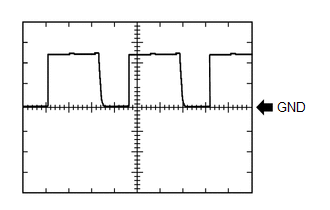 Measurement Condition Measurement Condition |
Item | Content | |
Tester Connection | G40-7 (VC5) - G40-11 (AGND) | |
Tool Setting | 2 V/DIV., 200 ms./DIV. | |
Condition | Engine switch off, electrical key transmitter sub-assembly not in cabin, within 30 seconds of engine switch pressed |
(8) Waveform 8 
|
*a | Approximately 160 ms. |
*b | Approximately 270 ms. | Measurement Condition |
Item | Content | |
Tester Connection | A10-3 (EFII) - G40-18 (E) | |
Tool Setting | 2 V/DIV., 500 ms./DIV. | |
Condition | Within
3 seconds of engine start or within 3 seconds of engine switch turned
on (IG) after cable disconnected and reconnected to battery |
(9) Waveform 9 
|
*a | Approximately 160 ms. |
*b | Approximately 270 ms. | Measurement Condition |
Item | Content | |
Tester Connection | A10-4 (EFIO) - G40-18 (E) | |
Tool Setting | 2 V/DIV., 500 ms./DIV. | |
Condition | Engine switch turned on (IG) using registered electrical key transmitter sub-assembly |
CHECK STEERING LOCK ECU (STEERING LOCK ACTUATOR OR UPPER BRACKET ASSEMBLY)
 (a) Disconnect the G43 steering lock ECU (steering lock actuator or upper bracket assembly) connector.
(b) Measure the voltage and resistance according to the value(s) in the table below.
HINT: Measure the values on the wire harness side with the connector disconnected. |
Terminal No. (Symbol) | Wiring Color |
Input / Output | Terminal Description |
Condition | Specified Condition |
Related Data List Item/DTC | |
G43-1 (GND) - Body ground |
W-B - Body ground | - |
Ground | Always |
Below 1 Ω | - | |
G43-6 (IG2) - G43-1 (GND) |
LG - W-B |
Input | IG signal (IG2 power supply input for steering lock motor) |
Engine switch off | Below 1 V |
- | | Engine switch on (IG) |
11 to 14 V | |
G43-7 (B) - Body ground |
W - Body ground | Input |
Constant power supply |
Always | 11 to 14 V |
- | (c) Connect the G43 steering lock ECU (steering lock actuator or upper bracket assembly) connector.
(d) Measure the voltage, and check for pulses according to the value(s) in the table below. |
Terminal No. (Symbol) | Wiring Color |
Input / Output | Terminal Description |
Condition | Specified Condition |
Related Data List Item/DTC | |
G43-3 (IGE) - G43-1 (GND) |
W - W-B | Input |
Steering
lock motor operation permission signal (motor operation permission
signal supplied by certification ECU (smart key ECU assembly)) |
Steering lock motor operating when all conditions met, and then door opened:
- Shift lever in P
- Steering unlocked
- Engine switch turned off
| Pulse generation
(See waveform 1) |
- Power Supply Short
- Unlock Request Receive
- Lock Request Receive
| | G43-4 (SLP1) - G43-1 (GND) |
BE - W-B | Output |
Steering lock bar position signal (signal output from steering unlock sensor) |
Steering locked → unlocked |
11 to 14 V → Below 1.5 V |
Sensor Value | |
G43-5 (LIN) - G43-1 (GND) |
B - W-B | Input / Output |
LIN communication line |
Engine switch on (IG) |
Pulse generation | Steering Lock Start Cond |
HINT:
- There is 1 motor and 2 sensors built into the steering lock actuator or upper bracket assembly.
- When taking measurements when the lock motor is stopped, it is not necessary to perform any operations.
- In order to take measurements when the lock motor is operating, perform either of the following operations:
- To unlock the steering, carry the key and turn the engine switch on (ACC) or on (IG).
- To lock the steering, turn the engine switch off with the shift lever in P, and then open a door.
(e) Using an oscilloscope, check the waveform. NOTICE: The waveform shown in the illustration is an example for reference only. Noise, chattering, etc. are not shown.
(1) Waveform 1 (Reference)
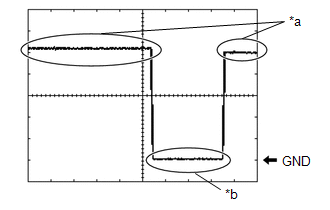
|
*a | Steering lock motor not operating | |
*b | Steering lock motor operating | Measurement Condition |
Item | Content | |
Tester Connection | G43-3 (IGE) - G43-1 (GND) | |
Tool Setting | 2 V/DIV., 200 ms./DIV. | |
Condition | Steering lock motor operating when all conditions met, and then door opened:
- Shift lever in P
- Steering unlocked
- Engine switch turned off
|
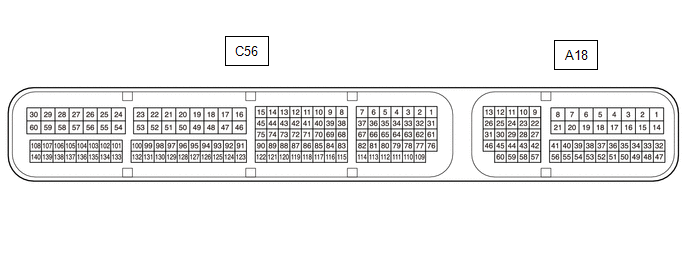 CHECK ECM (a) Measure the voltage and resistance, and check for pulses according to the value(s) in the table below. |
Terminal No. (Symbol) | Wiring Color |
Input / Output | Terminal Description |
Condition | Specified Condition |
Related Data List Item/DTC | |
A18-3 (+B2) - C56-53 (E1) |
L - W-B | Input |
Ignition power supply |
Engine switch on (IG) |
11 to 14 V | - | |
A18-2 (+B) - C56-53 (E1) |
L - W-B | Input |
Ignition power supply |
Engine switch on (IG) |
11 to 14 V | - | |
A18-46 (MREL) - C56-53 (E1) |
W - W-B | Input |
Ignition power supply |
Engine switch on (IG) |
11 to 14 V | - | |
A18-1 (BATT) - C56-53 (E1) |
R - W-B | Input |
+B power supply | Always |
11 to 14 V | - | |
C56-53 (E1) - Body ground |
W-B - Body ground | - |
Ground | Always |
Below 1 Ω | - | |
A18-45 (IMO) - C56-53 (E1) |
V - W-B | Output |
Certification ECU (smart key ECU assembly) communication output |
Engine switch off | 11 to 14 V |
- | | A18-45 (IMO) - C56-53 (E1) |
V - W-B | Output |
Certification ECU (smart key ECU assembly) communication output |
Within
3 seconds of engine start or within 3 seconds of engine switch turned
on (IG) after cable disconnected and reconnected to battery |
Pulse generation (See waveform 1) |
- | | A18-59 (IMI) - C56-53 (E1) |
GR - W-B | Input |
Certification ECU (smart key ECU assembly) communication input |
Engine switch off | 11 to 14 V → 1 V or less |
- | | A18-59 (IMI) - C56-53 (E1) |
GR - W-B | Input |
Certification ECU (smart key ECU assembly) communication input |
Engine switch turned on (IG) using registered electrical key transmitter sub-assembly |
Pulse generation (See waveform 2) |
- | (b) Using an oscilloscope, check the waveform.
NOTICE: The waveform shown in the illustration is an example for reference only. Noise, chattering, etc. are not shown.
(1) Waveform 1 (Reference)

|
*a | Approximately 160 ms. |
*b | Approximately 270 ms. | Measurement Condition |
Item | Content | |
Tester Connection | A18-45 (IMO) - C56-53 (E1) | |
Tool Setting | 2 V/DIV., 500 ms./DIV. | |
Condition | Within
3 seconds of engine start or within 3 seconds of engine switch turned
on (IG) after cable disconnected and reconnected to battery |
(2) Waveform 2 (Reference)

|
*a | Approximately 160 ms. |
*b | Approximately 270 ms. | Measurement Condition |
Item | Content | |
Tester Connection | A18-59 (IMI) - C56-53 (E1) | |
Tool Setting | 2 V/DIV., 500 ms./DIV. | |
Condition | Engine switch turned on (IG) using registered electrical key transmitter sub-assembly |
CHECK ENGINE SWITCH  (a) Measure the voltage and resistance according to the value(s) in the table below. |
Terminal No. (Symbol) | Wiring Color |
Input / Output | Terminal Description |
Condition | Specified Condition |
Related Data List Item/DTC | |
G41-6 (AGND) - Body ground |
BE - Body ground | - |
Transponder key amplifier ground |
Always | Below 1 Ω |
- | | G41-7 (TXCT) - G41-6 (AGND) |
GR - BE | Input |
Immobiliser communication input |
Engine switch off, brake pedal not depressed, 30 seconds or more after driver door opened and then closed |
Below 1 V | - | |
G41-8 (CODE) - G41-6 (AGND) |
B - BE | Output |
Immobiliser communication output |
Engine switch off, brake pedal not depressed, 30 seconds or more after driver door opened and then closed |
Below 1 V | - | |
G41-10 (VC5) - G41-6 (AGND) |
BE - BE | Input |
Transponder key amplifier power supply |
Engine switch off, brake pedal not depressed, 30 seconds or more after driver door opened and then closed |
Below 1 V | - |
(b) Check for pulses according to the value(s) in the table below. |
Terminal No. (Symbol) | Wiring Color |
Input / Output | Terminal Description |
Condition | Specified Condition |
Related Data List Item/DTC | |
G41-7 (TXCT) - G41-6 (AGND) |
GR - BE | Input |
Signal input from certification ECU (smart key ECU assembly) (Code
sent from certification ECU (smart key ECU assembly) to transponder key
amplifier built into engine switch, and then transmitted by transponder
key amplifier antenna as radio waves) |
Engine switch off, electrical key transmitter sub-assembly not in cabin, within 30 seconds of engine switch pressed |
Pulse generation (See waveform 1) |
| | G41-8 (CODE) - G41-6 (AGND) |
B - BE | Output |
Signal output to certification ECU (smart key ECU assembly) (Radio
waves from transponder key amplifier built into engine switch used to
detect key information. Key information then sent to certification ECU
(smart key ECU assembly)) | Engine switch off, engine switch pressed with electrical key transmitter sub-assembly held near engine switch* |
Pulse generation (See waveform 2) | |
G41-10 (VC5) - G41-6 (AGND) |
BE - BE | Input |
Transponder key amplifier power supply (Power
supplied from certification ECU (smart key ECU assembly) when
transponder key amplifier built into engine switch activated) |
Engine switch off, electrical key transmitter sub-assembly not in cabin, within 30 seconds of engine switch pressed |
Pulse generation (See waveform 3) |
HINT: *: Remove the transmitter battery before performing this inspection.
(c) Using an oscilloscope, check the waveform. NOTICE: The waveform shown in the illustration is an example for reference only. Noise, chattering, etc. are not shown.
(1) Waveform 1 (Reference)
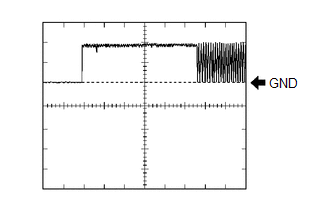 Measurement Condition Measurement Condition |
Item | Content | |
Tester Connection | G41-7 (TXCT) - G41-6 (AGND) | |
Tool Setting | 2 V/DIV., 20 ms./DIV. | |
Condition | Engine switch off, electrical key transmitter sub-assembly not in cabin, within 30 seconds of engine switch pressed |
(2) Waveform 2 (Reference)

|
*a | Waveform | |
*b | Waveform (detail) | Measurement Condition |
Item | Content | |
Tester Connection | G41-8 (CODE) - G41-6 (AGND) | |
Tool Setting |
- Waveform
1 V/DIV., 20 ms./DIV.
- Waveform (detail)
2 V/DIV., 100 μs./DIV.
| | Condition |
Engine switch off, engine switch pressed with electrical key transmitter sub-assembly held near engine switch* |
HINT: *: Remove the transmitter battery before performing this inspection.
(3) Waveform 3 (Reference) 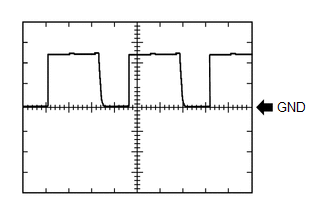 Measurement Condition Measurement Condition |
Item | Content | |
Tester Connection | G41-10 (VC5) - G41-6 (AGND) | |
Tool Setting | 2 V/DIV., 200 ms./DIV. | |
Condition | Engine switch off, electrical key transmitter sub-assembly not in cabin, within 30 seconds of engine switch pressed | |

 Measurement Condition
Measurement Condition 
 Measurement Condition
Measurement Condition 
 Measurement Condition
Measurement Condition 
 Measurement Condition
Measurement Condition 







 Measurement Condition
Measurement Condition 
 Measurement Condition
Measurement Condition